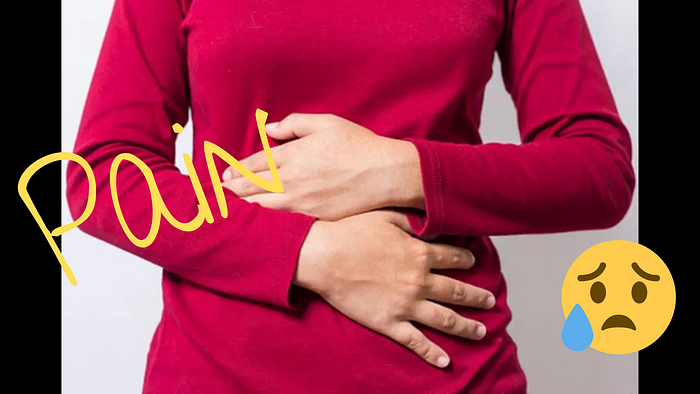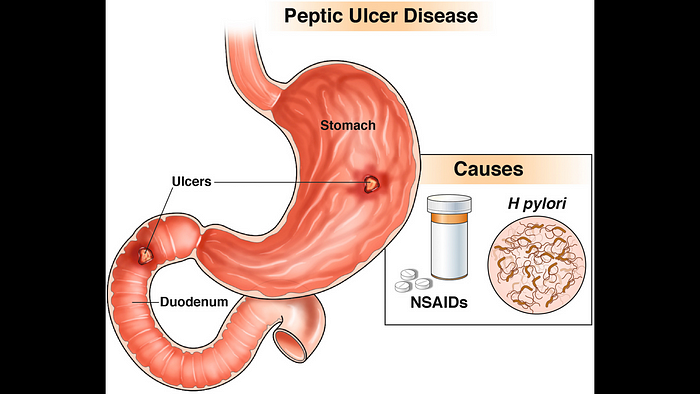What is Peptic Ulcer?
Symptoms, Causes, Treatment, Prevention

Peptic Ulcers are open sores developed in the lining of the stomach, lower esophagus, or duodenum(small intestine).
Researches show that in the USA around 4.6 million people(estimated 10% of US population) having peptic ulcer at once in their lifetime.
Usually, a thick layer of mucus protects the stomach and duodenum from the effects of digestive acids. But bacteria and some anti-inflammatory drugs damaged the protected lining and developed sores that cause pain and discomfort.
The common cause of peptic ulcer is Helicobactor Pylori(H.pylori) bacteria that eats the protected layer of the stomach and small intestine and certain types of nonsteroidal anti-inflammatory drugs(NSAID).
Peptic Ulcer is curable, usually treated by PPI(proton pump inhibitors) and a combination of antibiotics.
Types of Peptic ulcer
There are three types of peptic ulcer:
Gastric ulcers: The painful sores that develop in the protected lining of the stomach.
Esophageal ulcers: The sores that form inside the esophagus.
Duodenal ulcers: The sores that develop in the small intestine called the duodenum.
Symptoms
The typical symptom of a peptic ulcer is abdominal pain that can extend from the belly button to chest bone. More likely, the pain starts on an empty stomach.
The pain may stop for a while and last for hours. If it takes an antacid, it may relieve for a day or a week but returns.
Other symptoms that reports commonly include:
Nausea
Loss of appetite
Indigestions
Bloating
Weight loss
Over-the-counter medication can provide temporary relief. In some cases, peptic ulcer causes severe symptoms like:
Dark stool with blood
Vomiting
The severe symptoms are alarming and indicate seeking medical assistance.
Causes

Usually, a peptic ulcer occurs when digestive juices break down the protected lining of the digestive tract and create painful sores that can even bleed.
The digestive system has a protected layer of thick mucus that protects the tract against digestive acids. In some cases, the number of digestive juices increase and causes peptic ulcers.
The most common causes are:
Helicobacter Pylori bacteria:
A type of bacteria that lives in the thick protected layer of the digestive tract. Most people carry H.Pylori, but it causes ulcers in some people.
H.Pylori releases an enzyme that neutralizes digestive acids. To compensate for this stomach creates more acids, and this hurts the lining and develops painful sores.
H.pylori also attacks the defense system of the stomach and causes inflammation.
Patients with these symptoms causes by H.pylori need medical treatment to get rid of the bacterium.
Nonsteroidal anti-inflammatory medications(NSAIDs):
Frequently uses of NSAIDs is another major cause of peptic ulcers. Commonly used OTC pain relievers include aspirin, ibuprofen, naproxen.
NSAIDs stop the body from making chemicals that help protect the inner walls of the stomach and small intestine from digestive acids.
They also reduce the body’s ability to repairing cells and badly affect the blood flow to the stomach and small intestine.
Other causes of peptic ulcer:
Smoking: Regular smokers have more likely to develop peptic ulcers if infected with H.pylori.
Too much alcohol consumption: People who drink access alcohol have a higher risk of developing peptic ulcers.
Alcohol can damage the mucus lining of the stomach and increase the number of acids.
Genetics: Genetic factors may be involved in a significant number of people who have relatives with peptic ulcers.
Corticosteroids use: People with chronic diseases often prescribed heavy doses of corticosteroids are also at higher risk of peptic ulcers.
Stomach cancer: Rarely stomach cancer can also cause peptic ulcers.
Diagnoses

There are three types of tests available for diagnosing peptic ulcers.
H.pylori test: a blood test to check H.pylori, though the positive test may not always mean active infection.
Imaging test: X-ray or CT scans used to detect peptic ulcers.
Endoscopy: If the symptoms are severe, more likely to recommend endoscopy. A long tube with a tiny camera at its end, through the throat into the stomach and intestine, looks for peptic ulcers.
Complications
Peptic ulcer may lead to severe problems if left untreated:
Internal bleeding: Bleeding sores can lead to a severe health condition. Common symptoms of internal bleeding are dizziness, lightheadedness, black or tarry stool.
Perforation(holes in the stomach wall): Untreated ulcers can develop holes in the protected lining of the stomach and intestine for a long time. Sudden and severe abdominal pain occurs as the result of perforation.
Gastric cancer: It also leads to gastric cancer.
Treatment
The treatment depends on the causes of peptic ulcers. The health provider will focus on either lowering the stomach acids level or treating H.pylori with antibiotics.
Patients infected with H.pylori are often treated with different antibiotics. These medicines kill bacteria, and ulcers start disappearing within few days.
PPI medicines reduce stomach acids that help in healing peptic ulcers.
Prevention
Specific measures help to reduce the risk of peptic ulcers.
H.pylori could be transmitted from person to person through close body contact, food, or water.
It can avoid taking appropriate safety measures such as frequently washing hands with soap and water, eat food that cooks entirely at high temperature.
Avoid high doses of pain relievers. Ask the Doctor for alternatives to NSAID(acetaminophen) for pain relief or a lower amount of NSAID and make sure to take it with a meal.
Quit smoking
Drink alcoholic beverages in moderation.
Diet for peptic ulcer

Food rich in antioxidants helps to activate the immune system and helps to fight bacteria. They also protect against stomach cancer.
Foods rich in vitamin A and fiber dissolve quickly that helps to reduce the amount of digestive juices.
Soluble fiber sources include:
Apples
Carrots
Oranges
Nuts
Flaxseeds
Legumes
Barley
Psyllium husk
Vitamin A sources:
Sweet potato
Kale
Collard greens
Spinach
Broccoli
Liver
Fermented food such as miso, sauerkraut, kimchi may help to stop growing bacteria again.
Turmeric is traditionally known as an anti-bacterial and anti-fungal agent that heals the sores in the stomach lining.
Researches show that olive oil has essential fatty acids that help to treat H.pylori.
The addition of garlic and green tea might helps to avoid stomach and small intestine ulcers.
A balanced diet with fresh fruits, vegetables, and less flavoring and spices would help to prevent and treat peptic ulcers.
